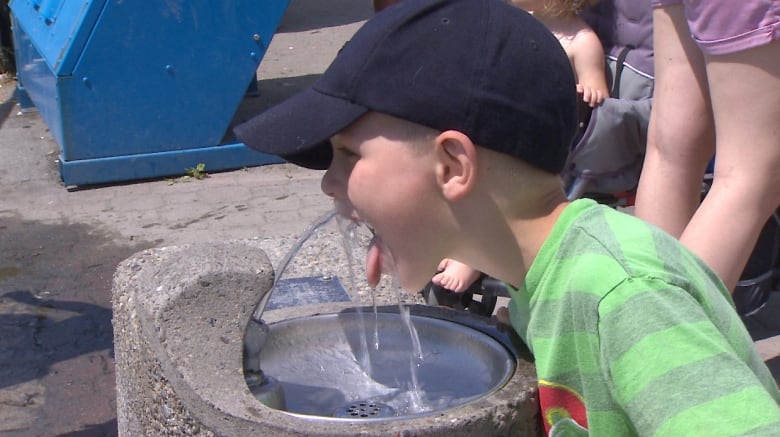Extreme heat alerts issued as weather agency warns of Catch-22 from smoke, high temperatures
Fraser Valley registers worst air in B.C. on Thursday; Air quality warning also issued for Metro Vancouver

A small herd of cows grazes against a hazy backdrop in Chilliwack, as nearby farmers spray water over fields quickly drying in the rising heat, the usual mountain backdrop shrouded in smoke.
The air smelling like a bonfire stings to inhale.
On Thursday evening, Vancouver Coastal Health and Fraser Health issued an extreme heat alert, warning that high temperatures could lead to illness and even death in parts of the Lower Mainland if precautions aren't taken.
The warning comes as smoke that's choked communities in B.C.'s Interior for weeks drifts to the coast. Environment Canada has also issued air quality advisories for most of the southern third of the province.
The Fraser Valley was already cloaked in some of the worst smoke in the entire province on Thursday.
Look out for symptoms of heat stress during hot days.<br>✔️ High body temperatures<br>✔️ Dizziness/fainting<br>✔️ Confusion<br><br>These symptoms require immediate medical attention.<a href="https://t.co/njt7E0Ogt5">https://t.co/njt7E0Ogt5</a><a href="https://twitter.com/CDCofBC?ref_src=twsrc%5Etfw">@CDCofBC</a> <a href="https://twitter.com/Healthyfamilybc?ref_src=twsrc%5Etfw">@Healthyfamilybc</a> <a href="https://twitter.com/hashtag/BCweather?src=hash&ref_src=twsrc%5Etfw">#BCweather</a> <a href="https://twitter.com/hashtag/hotweather?src=hash&ref_src=twsrc%5Etfw">#hotweather</a> <a href="https://t.co/dNyWx18zkr">pic.twitter.com/dNyWx18zkr</a>
—@FraserhealthHealth authorities say the combination of extreme heat and poor air quality poses a Catch-22 for the most vulnerable, particularly seniors living alone and those with health conditions — who are at disproportionate risk from indoor heat but also from smoke.
Outside, exposure to the smoke can make it difficult to breathe, but experts warn that indoor temperatures can pose an even greater health danger than the smoke.
"In a lot of ways it's pick your poison for vulnerable people," Environment Canada meteorologist Armel Castellan said, "but heat is probably the worst."
In Abbotsford, a new daily temperature record of 39.4 C was set Thursday, beating the previous high for Aug. 12 by more than five degrees. Squamish hit 40.2 degrees, smashing the record set in 1992 by nearly seven degrees.
Communities from Port Alberni on Vancouver Island to Bella Coola on the Central Coast and Tatlayoko Lake in the Chilcotin also set new highs for the date.
WATCH | B.C. is better prepared for latest heat wave, officials say:
Castellan said temperatures in Metro Vancouver are expected to reach up to 37 C over the coming days — not quite as dangerous as the record-shattering "heat dome" in late June, but a health threat nonetheless.
"The wildcard is smoke," he said. "We do have smoke making its way down from the Interior into the Fraser Valley."
On Thursday morning, Chilliwack and Hope had the worst air quality in the entire province. Their fine-particle pollution levels were nine times World Health Organization's safe guidelines. By late afternoon, they were eclipsed by even worse air quality in Trail, Nelson and Kelowna, where levels hit more than 20 times the healthy limit.
Overnight cooling centre opens in Vancouver
In response to the extreme heat alert from local health authorities, the City of Vancouver announced that an overnight cooling centre would be activated in the Gathering Place at 609 Helmcken St.
Health authorities are warning that the heat can be deadly for residents of the Lower Mainland, who may not be acclimated to extreme temperatures or have access to air conditioning. They're asking residents to regularly check on vulnerable neighbours and friends, avoid exercise and stay hydrated.
That was also the message from Provincial Health Officer Dr. Bonnie Henry in a news conference a day earlier.
June's heat wave caused at least 570 deaths, according to the B.C. Coroner's Service — many of them seniors living in isolation.
"[We have] been though that tragedy, recognizing how quickly it can affect people — particularly people who are older, who are living on their own, who may not even recognize the symptoms," Henry told reporters Wednesday afternoon.
"We know these anticipated temperatures can cause negative health outcomes. Indoor temperatures getting up so high can have a really quick … fatal effect on people whose bodies can't adapt to that heat."
She said if anyone has severe heat-related symptoms, call 911, get to a cooler place immediately and drink water. Symptoms include high body temperatures, dizziness or fainting, and confusion.

However, some B.C. residents reported waiting for hours after calling 911 as calls stacked up during June's heat dome.
Henry warned that for the many residents who lack air conditioning, fans can be ineffective or even more dangerous at extreme indoor temperatures, circulating warm air and causing dehydration.
She said instead, it's important to either apply a cool, wet cloth to one's skin in front of a fan, take a cool or tepid shower or bath and freeze towels to put on one's neck.
At night, if temperatures remain high, she suggested dampening a bedsheet or even sleeping in an underground space, a friend's cooler home, or outdoors if safe to do so.
Forecasted concentrations of fine wildfire smoke particles (PM2.5) at ground level:
To zoom in on map, double-tap, hold and drag to your location. Source: FireSmoke.ca, with data from the UBC Weather Forecast Research Team.
With files from Bethany Lindsay


